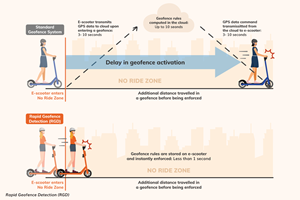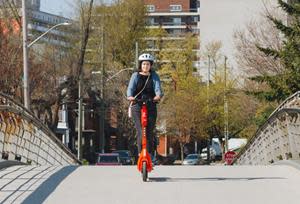Neuron Trials the World’s Most Sophisticated E-scooter With a Range Of ‘Smart Sensors’ to Drive E-scooter Safety
●Neuron Mobility kicks off global trial in four cities to test its revolutionary new ‘e-scooter brain’●New ‘e-scooter brain’ includes three important new technologies: High Accuracy Location Technology (HALT); Rapid Geofence Detection (RGD); and Dangerous Riding Detection (DRD) with a range of smart sensors to educate and profile riders●The world’s first Dangerous Riding Detection (DRD) system counteracts a range of unsafe behaviours including sidewalk riding, aggressive swerving, skidding, tandem riding and curb jumping●Neuron’s High Accuracy Location Technology (HALT) can detect an e-scooter’s location to within 10cms, making it at least 50 times more accurate than the average GPS-based location system●Rapid Geofence Detection (RGD) feature triggers the e-scooter to respond to a geofence in 0.3 seconds allowing unprecedented control of how e-scooters are managed in cities
Neuron Mobility Global Technology Trial

Rapid Geofence Detection (RGD) versus standard geofence system
Neuron Mobility

Ottawa e-scooter rider
Ottawa, ON, Canada, Nov. 03, 2021 (GLOBE NEWSWIRE) -- Safety-leading e-scooter operator, Neuron Mobility, has announced the launch of a six-month global trial across four cities in three countries to put its revolutionary new ‘e-scooter brain’ to the test. Ottawa has been selected as the initial Canadian trial city.
Fitted to the company’s N3 e-scooters, the new ‘e-scooter brain’ is the label for three new cutting-edge technologies developed by Neuron that will make its e-scooter the most sophisticated ever produced. The technology will give Neuron and the cities managing shared e-scooter programs unprecedented control of how the vehicles are ridden and parked.
The range of new technologies that make up the e-scooter brain include High Accuracy Location Technology (HALT), Rapid Geofence Detection (RGD), and an array of multi-function sensors and a new proprietary vehicle operating system. Used together, these features facilitate the world’s first Dangerous Riding Detection (DRD) system for e-scooters which will allow the company to correct or warn of unsafe behaviours in real time, while also profiling users and incentivizing safe riding.
A new video showcasing Neuron’s latest ‘e-scooter brain’ innovations can be found here.
High Accuracy Location Technology (HALT) and Rapid Geofence Detection (RGD)
HALT is the next step in e-scooter precision location tracking. Using a sophisticated fixed base station within a city, which connects wirelessly to a receiver in the e-scooter, HALT corrects GPS inaccuracies, allowing every vehicle’s location to be tracked in real time down to a range of within 10cms. This is at least 50 times more accurate than the e-scooter industry’s average GPS location system, which plots a vehicle’s location to five to 10 metres or more within cities.
Neuron’s RGD feature works with HALT to give unparalleled control of how e-scooters are managed in cities. With RGD, an e-scooter can respond in 0.3 seconds, rather than the six to 12 seconds it currently takes most rental e-scooter models to react when crossing a geofence, such as a no-ride or go-slow zone. This improvement is achieved by storing geofence data and rules of how an e-scooter should behave in the e-scooter’s brain, rather than in the cloud, which significantly cuts down on processing time.
Combining Neuron’s high precision location capabilities of HALT with the ability to react almost immediately to geofences using RGD, provides City transport managers with the ultimate next generation technology they have been searching for from an e-scooter operator. Using these two technologies Neuron will now be able to detect and control sidewalk riding, provide high accuracy geofencing, and also designate precise smart parking locations.
Dangerous Riding Detection (DRD)
The e-scooter brain also includes an array of sophisticated multi-function sensors, which combined with the company’s proprietary vehicle operating system, allow Neuron’s e-scooters to operate the world’s first DRD system. It will monitor, in real time, a range of unsafe riding behaviours such as sidewalk riding, aggressive swerving, skidding, tandem riding, and ‘curb jumping’. Using this data, Neuron will be able to deliver immediate alerts to riders or follow up later with targeted rider education modules. Longer-term, the system will be able to profile different types of riders, giving them an individual safety rating, which provides the opportunity to incentivize good riding behaviour, as well as tackle problem riding.
Global trials to assess real-life effectiveness
Neuron’s new e-scooter brain will initially be beta tested on 1,500 e-scooters in different cities and environments around the world, including Ottawa in Canada, Brisbane and Darwin in Australia, and Slough in the United Kingdom. The trials will take place over a six-month period across these cities and will assess how riders behave in all kinds of real-life situations and how safe riding can be encouraged. The findings will be evaluated, the technology refined, and selected features will be rolled out across Neuron’s fleet internationally over the next 12 months.
Zachary Wang, CEO of Neuron Mobility, said: “Recently there’s been plenty of industry talk from micromobility operators about how to apply new technology to better control e-scooters in cities, but until now it’s mostly been aspirational or theoretical.”
He continued: “Our trial is the first of its kind - we’ll have 1,500 e-scooters in cities across the world being tested in real-world situations to improve rider behaviour and safety. With the introduction of ultra-precise location, rapid response to geofencing, plus an array of new sensors we’ll be able to correct rider behaviour while also putting the cities more in control of their e-scooter programs.”
He concluded: “The launch of our Dangerous Riding Detection technology allows us to profile our riders, and we can take a carrot and stick approach to improving behaviour. In some cases, alerting a rider to a dangerous behaviour at the exact moment it happens, then immediately educating them on how to rectify the situation, could help to change bad habits and improve safety. Long-term we can give all riders an individual safety rating. It will allow us to incentivize good behaviour, target certain riders for refresher training, and also ban rogue riders and repeat offenders for riding dangerously.”
Robyn Robertson, President & CEO of the Traffic Injury Research Foundation (TIRF), who earlier this year announced a partnership with Neuron focused on research and education, added: “TIRF wants to see everyone get home safe every day. Partners like Neuron are taking e-scooter safety to the next level by adopting stronger measures and features to help achieve this goal. This approach needs to become a standard for the introduction of micromobility options into communities. Neuron’s new Dangerous Riding Detection technology is a great step forward to educate e-scooter riders, to correct unsafe usage and incentivize protective riding practices. However, it’s important to remember the onus is ultimately on e-scooter riders to make safe choices and follow the rules. All of us who use the roads, irrespective of the mode of transport, share a responsibility to keep ourselves and the people around us safe.”
Ongoing focus on safety innovation
In August, Neuron also launched a Warning Noise Trial in Ottawa to test the impact of an always-on warning noise on its e-scooters which alerts pedestrians, particularly those with vision loss, that an e-scooter is approaching. The trial, which is the first of its kind in Canada, currently features the addition of an Audio Vehicle Alert System on up to 100 of Neuron’s “safety orange” e-scooters. The company is working closely with the City of Ottawa and leading accessibility groups on completing this trial and determining outcomes.
Neuron’s next-generation N3 e-scooters have been purpose-built to a commercial grade, specifically for renting and rider safety. They have visibly larger, 11.5” wheels and wider footplates than other e-scooters, and deliver the highest levels of safety, stability and rider experience, to give users an extra level of confidence.
The e-scooters feature the world’s first app-controlled Helmet Lock, which secures a safety helmet to the e-scooter, electronically releasing it to use at the start of the booking. Riders benefit from multi-language voice guidance to educate them on how to travel safely; a Follow My Ride feature allows riders to share their trip with friends and family in real time for added safety; and a 911 emergency button can tell if someone has had a fall, then help them call the emergency services. A topple detection feature alerts Neuron’s operations team if an e-scooter has been left on its side so it can be repositioned. Geofencing technology controls where e-scooters are ridden and parked, and how fast they can travel in certain areas.
-ENDS-
About Neuron Mobility
Neuron, Australia and New Zealand’s leading e-scooter operator, differentiates by being the best partner to cities while also leading the industry when it comes to safety and sustainable operations. Founded in Singapore in 2016, the company has introduced an impressive number of industry world firsts and pioneering innovations including e-scooter battery swapping, geofencing control and integrated helmets. Neuron operates in 14 locations in Australia and New Zealand including Brisbane, Darwin, Adelaide, Canberra, Townsville, Bundaberg, Auckland and Dunedin. The company also launched in the United Kingdom during 2020 and now operates in Slough, Newcastle and Sunderland. It launched in South Korea in 2021 in Seoul and Ansan. Neuron announced its arrival into the Canadian market in May 2020 and has since won licences to operate in Ottawa, Calgary, Red Deer and Vernon.
For more information, visit: https://rideneuron.com
Attachments
CONTACT: Gwen McGuire Neuron Mobility 416-948-6500 gwen.mcguire@neuron.sg


 Yahoo Finance
Yahoo Finance 